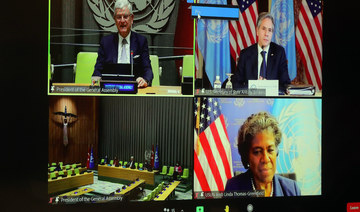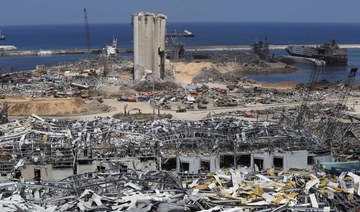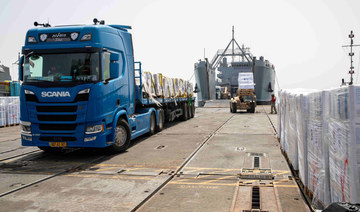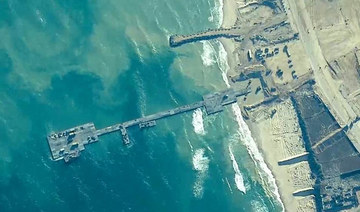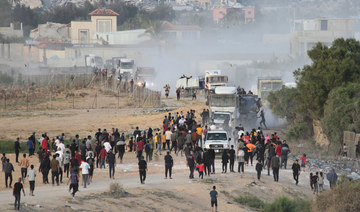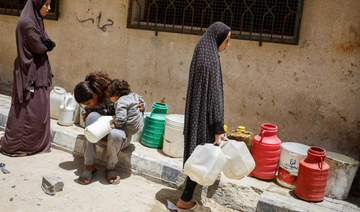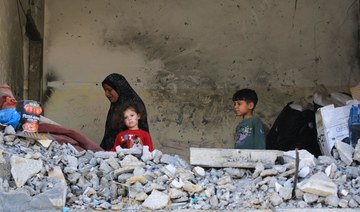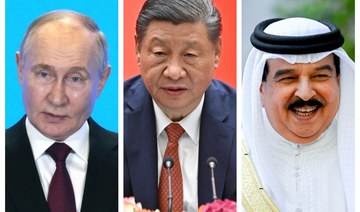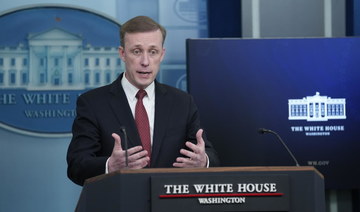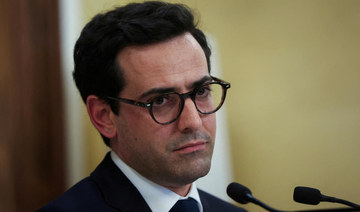NEW YORK: The permanent US representative to the UN, Linda Thomas-Greenfield, on Wednesday accused the Assad regime of blocking the drafting of a new constitution. She also warned that the “so-called May 26 elections (will) be neither free nor fair, and will not be representative of the Syrian people.”
“While the Assad regime run their sham elections, the people of Syria continue to suffer,” she said.
Elections in Syria must be held under the auspices of a new constitution and supervised by the UN, as was mandated unanimously by the Security Council, Thomas-Greenfield said.
“The Assad regime must secure steps to enable the participation of refugees, internally displaced people and the diaspora in any Syrian election,” she added. “Until then we will not be fooled.”
She reiterated that Washington “will not support reconstruction aid that benefits the regime absent progress in achieving the political reforms called for in (Security Council) Resolution 2254.”
She also condemned Assad for “hindering and weaponizing” the delivery of aid supplies. As the humanitarian situation continues to deteriorate, the envoy urged council members to reauthorize the Bab Al-Hawa crossing and reinstate the crossings at Bab Al-Salam and Yaroubiyah, a move that has been vetoed by Russia and China.
“Should the UN lose access to cross-border mechanisms, the COVID crisis in Syria will go from dire to disastrous,” said Thomas-Greenfield.
“Four million people inside northwest Syria depend on the 1,000 UN trucks that use the crossing each month. There is no alternative. Nothing can match the scope and the scale of the UN cross-border humanitarian mechanism. In fact, it’s quite clear that one sole crossing point is insufficient for the vast needs.”
She also highlighted what she described as a “deep moral wrong” that is unfolding in the Rukban refugee camp.
“For 16 months the camp’s residents have been without medical aid because the Assad regime and Russia will not allow the UN to make deliveries to these people in need,” she said.
“We urge the Assad regime and Russia to allow unhindered humanitarian access to the camp. These people are not pawns. Aid cannot be politicized.”
Her Russian counterpart on the Security Council, Vassily Nebenzya, responded by defending the Syrian regime and repeating its rhetoric. He blamed the worsening humanitarian situation on “relentless sanctions pressure exerted by the collective West,” and the deteriorating security situation on “terrorists using civilians as human shields.”
He also welcomed the prospect of next month’s elections as part of the Syrian government’s efforts to “ensure the state is functioning.”
“We lament the fact that some countries are up in arms against the very idea of upcoming elections and are ready declaring them illegitimate,” Nebenzya said. “(The) interference in the internal affairs of the Syrians is unacceptable and contradicts the existing norms of international law.”
He added that “the negative background information on the upcoming elections” has nothing to do with the work of the constitutional committee.
Geir Pedersen, the UN’s special envoy for Syria, reiterated that the elections scheduled for May 26 were called under the auspices of the existing Syrian Constitution, and are not part of the political process established by Security Council Resolution 2254.
“The UN is not involved in this election and has no mandate to be,” he told the council. “Resolution 2254 mandates the UN to facilitate a political process that culminates in the holding of free and fair elections in accordance with a new constitution, administered under United Nations supervision to the highest international standards of transparency and accountability, with all Syrians, including members of the diaspora, eligible to participate.”
He urged council members to prioritize a “proactive search” for a political settlement to the conflict, saying that events in the past month have demonstrated how easily the situation could deteriorate, despite a year of relative calm “by Syrian standards.”
There has been a significant escalation of fighting in northwest Syria, including air strikes on a UN-supported hospital in western Aleppo close to densely populated camps for internally displaced persons, where UN humanitarian aid is delivered. Residential areas in the city have also been shelled.
Meanwhile Daesh continued its assaults in central and northeastern Syria. In one incident dozens of civilians were kidnapped in rural Hama.
“It is all too easy to become immune to these kinds of developments and the dangers they could lead to,” said Pedersen.
He also said that he met with The Syrian Women’s Advisory Board in Geneva this week, and its members voiced fears that “differences among external actors would perpetuate the Syrian conflict.”
“Let us not forget that, in addition to challenges facing all Syrians, many women have also experienced sexual and gender-based violence, early and forced marriage, and trafficking,” he added.
“And with men killed and injured in large numbers, more women than ever are heading households — against the backdrop of violence, terrorism, displacement, instability, destitution and pandemic.”
Pedersen said the women he talked to also stressed the need for progress to be made on the issue of the thousands of people who remain locked up, abducted or missing, as there has been little so far.
“Allow me to stress again the importance of unblocking progress on detainees, abductees and missing persons,” he said. “As long as this file remains largely frozen, many Syrians will be unable to even begin to think of moving on, and Syria’s social fabric cannot begin to be restored.”
Pedersen also expressed concern about the economic destitution that Syrians face, with food prices at historic highs and no sign of inflation abating.
“12.4 million (people) are now food insecure, an increase of 4.5 million in the past year alone,” he said. “Fuel shortages remain a key concern as well.
“A large-scale, cross-border response for an additional 12 months remains essential to save lives. I appeal for the members of the council to focus on achieving consensus to that end.”
Assad is indulging in ‘sham elections’ as Syrians continue to suffer, UN told
https://arab.news/4uvej
Assad is indulging in ‘sham elections’ as Syrians continue to suffer, UN told

- US envoy says until all Syrians, including refugees, can vote ‘we will not be fooled;’ accuses regime of ‘weaponizing’ humanitarian aid
- UN’s special envoy for Syria says elections fail to comply with Security Council resolution; highlights suffering of women during conflict
More aid getting from US pier to people in Gaza, officials say, after troubled launch
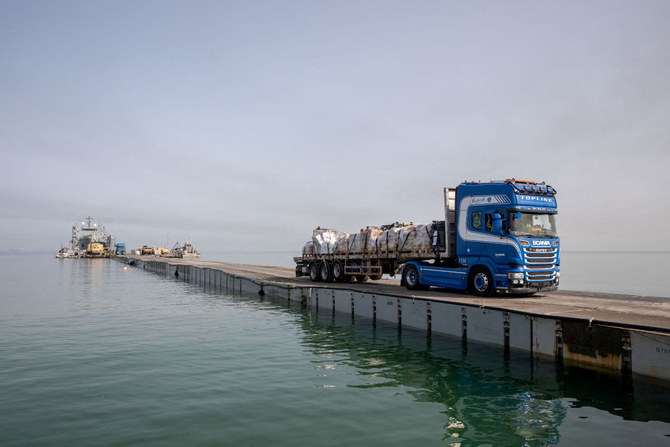
- Crowds overrun some of the first trucks coming from the new US-led sea route and taking its contents over the weekend, leading to a two-day suspension of aid distribution
- At maximum capacity, the pier would bring in enough food for 500,000 of Gaza’s people. US officials stressed the need for flow through open land crossings for the remaining 1.8 million
WASHINGTON: A six-day-old US pier project in Gaza is starting to get more aid to Palestinians in need but conditions are challenging, US officials said Thursday. That reflects the larger problems bringing food and other supplies to starving people in the besieged territory.
The floating pier had a troubled launch, with crowds overrunning some of the first trucks coming from the new US-led sea route and taking its contents over the weekend. One man in the crowd was shot dead in still-unexplained circumstances. It led to a two-day suspension of aid distribution.
The US military worked with the UN and Israeli officials to select safer alternate routes for trucks coming from the pier, US Vice Admiral Brad Cooper told reporters Thursday.
As a result, the US pier on Wednesday accounted for 27 of the 70 total trucks of aid that the UN was able to round up from all land and sea crossings into Gaza for distribution to civilians, the United States said.
That’s a fraction of the 150 truckloads of food, emergency nutrition treatment and other supplies that US officials aim to bring in when the sea route is working at maximum capacity.
Plus, Gaza needs 600 trucks entering each day, according to the US Agency for International Development, to curb a famine that the heads of USAID and the UN World Food Program have said has begun in the north and to keep it from spreading south.
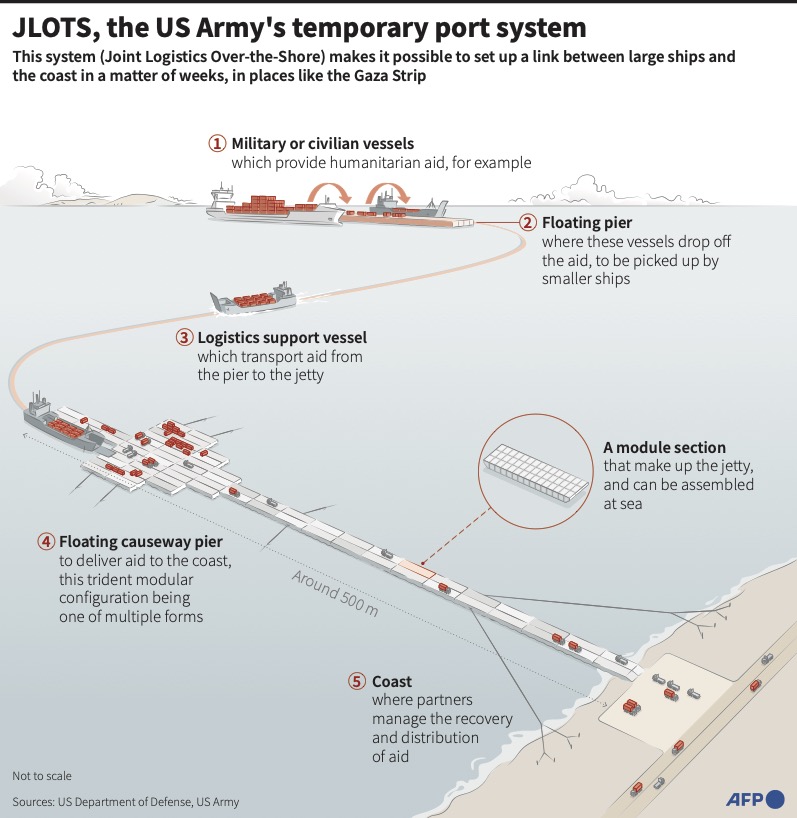
Only one of the 54 trucks that came from the pier Tuesday and Wednesday encountered any security issues on their way to aid warehouses and distribution points, US officials said. They called the issues “minor” but gave no details.
A deepening Israeli offensive in the southern city of Rafah has made it impossible for aid shipments to get through the crossing there, which is a key source for fuel and food coming into Gaza. Israel says it is bringing aid in through another border crossing, Kerem Shalom, but humanitarian organizations say Israeli military operations make it difficult for them to retrieve the aid there for distribution.
The Biden administration last week launched the $320 million floating pier for a new maritime aid route into Gaza as the seven-month-old Israel-Hamas war and Israeli restrictions on land crossings have severely limited food deliveries to 2.3 million Palestinians.
For all humanitarian efforts, “the risks are manifold,” Daniel Dieckhaus, USAID’s response director for Gaza, said at a briefing with Cooper. “This is an active conflict with deteriorating conditions.”
Dieckhaus rejected charges from some aid groups that the pier is diverting attention from what the US, UN and relief workers say is the essential need for Israel to allow full access to land crossings for humanitarian shipments.
For instance, Jeremy Konyndyk, a former USAID official now leading Refugees International, tweeted that “the pier is humanitarian theater.”
“I would not call, within a couple of days, getting enough food and other supplies for tens of thousands of people for a month theater,” Dieckhaus said Thursday when asked about the criticism.
At maximum capacity, the pier would bring in enough food for 500,000 of Gaza’s people. US officials stressed the need for flow through open land crossings for the remaining 1.8 million.
Three US troops have non-combat injuries during Gaza pier operation
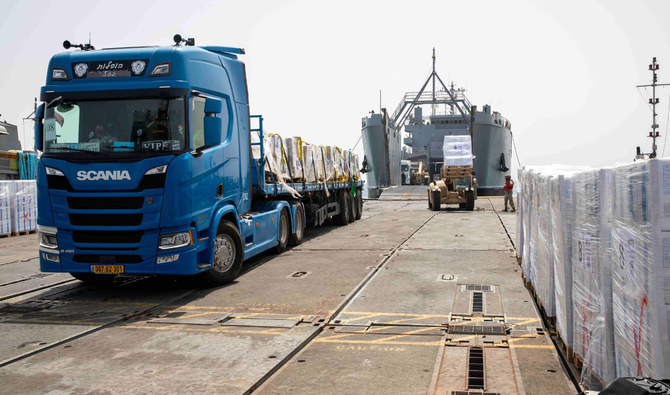
WASHINGTON: Three US troops suffered non-combat injuries in the effort to make a temporary pier off the coast of Gaza into a conduit for humanitarian aid, with one in critical condition at an Israeli hospital, US officials said on Thursday.
The injuries were the first for US forces during the latest operation to bring humanitarian aid to Palestinians.
The pier was announced by US President Joe Biden in March and involved the military assembling the floating structure off the coast. Estimated to cost $320 million for the first 90 days and involve about 1,000 US service members, it went into operation last week.
US Vice Admiral Brad Cooper, the deputy commander of US Central Command, told reporters that two of the troops had a sprained ankle and a minor back injury.
“Two were very minor, routine injuries. Those individuals returned to duty,” Cooper said.
A third service member, injured on a ship at sea, was medically evacuated to a hospital in Israel, he said. A US defense official, speaking on the condition of anonymity, said the individual was in critical condition.
US lawmakers have voiced concern about the risks to positioning US troops off the coast of Gaza. Biden has said they will not step foot in the war-torn city itself.
The Pentagon has said it will prioritize the safety of US military personnel.
“We’re clear eyed and we continue to look at force protection all day, every day and as it stands now we assess the operations can continue,” Cooper said.
Social media images showed a US air defense system, known as the Counter Rockets, Artillery and Mortars (CRAM), firing into the sky while on the pier. US officials said troops were testing the system.
Daniel Dieckhaus of the US Agency for International Development said that since the pier opened last week, about 506 metric tons of aid had been handed off to humanitarian groups inside Gaza. About a third of that has not yet been distributed but would be soon, he said.
Medic says Gaza hospital under Israeli siege for fifth day
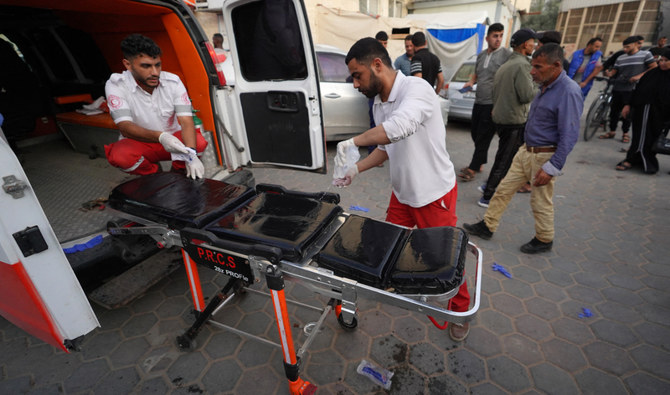
GAZA STRIP: A senior official at Al-Awda Hospital in northern Gaza said it was under Israeli military siege for a fifth straight day on Thursday after soldiers stormed it the previous day.
“We are still under siege for the fifth day in a row,” said the hospital’s acting director, Dr. Mohammed Saleh.
“Soldiers are present in the hospital’s courtyard and nearby houses,” he said, adding that there was “continuous gunfire and shelling” toward it.
Troops stormed the hospital building on Wednesday evening, he said.
“The hospital was stormed, and staff were forced to leave. I currently have only 13 staff, 11 patients, and two women accompanying wounded children,” Saleh said.
World Health Organization chief Tedros Adhanom Ghebreyesus said on social media platform X that 140 staff, patients, and accompanying adults were inside the hospital when troops stormed it.
The WHO visited Al-Awda regularly in April to deliver medical supplies and fuel, but on Tuesday Ghebreyesus said snipers were targeting the building and artillery had hit the fifth floor.
On Tuesday, patients and staff were also evacuated from another hospital in northern Gaza, Kamal Adwan, its director, Dr. Hossam Abu Safia, said at the time.
“These are the only two functional hospitals remaining in northern Gaza. Ensuring their ability to deliver health services is imperative,” Ghebreyesus said in Geneva.
Israeli troops have previously raided other medical facilities in Gaza, including Al-Shifa in Gaza City, the territory’s largest hospital, which was reduced to rubble after an operation in March, the WHO said.
Bahrain’s King Hamad says he is looking forward to improved relations with Iran
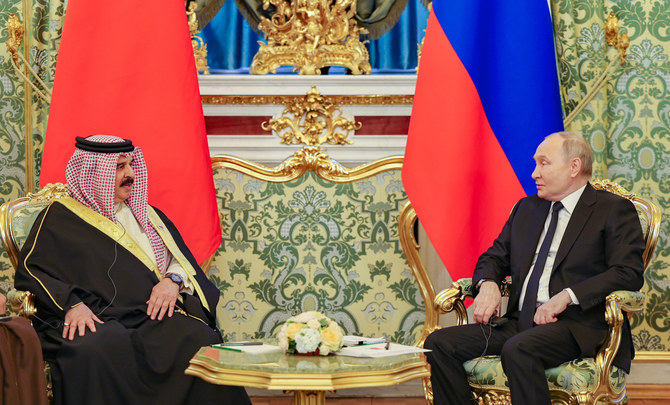
- King meets Russian President Vladimir Putin at the Kremlin
RIYADH: Bahrain’s King Hamad said his country was looking forward to improving its relations with Iran during a meeting with Russian President Vladimir Putin at the Kremlin.
The king added that there was no reason for Bahrain to postpone the resumption of diplomatic relations with Iran, the Bahrain News Agency reported on Thursday.
The king and Putin discussed the war in Gaza, regional and international efforts aimed at reaching a ceasefire, and the release of hostages and detainees. They also focused on providing humanitarian aid without obstacles to the territory’s civilian population.
They highlighted the importance of advancing the course of diplomatic action to settle the Palestinian-Israeli conflict, and achieving a Palestinian state with East Jerusalem as its capital. The leaders also said efforts to recognize the Palestinian state and accept it as a permanent member of the UN should be supported.
They also stressed the importance of the UN Security Council assuming its responsibilities toward resolving and ending global conflicts, and working to settle them in accordance with the rules of international law and the UN Charter to maintain international peace and security.
The king informed the Russian president of the outcomes of the Arab Summit held recently in Bahrain, adding that Arab countries appreciated Russia’s sympathy for just Arab causes.
The king and Palestinian President Mahmoud Abbas called for the convening of an international conference at the summit, which would take place under the auspices of the UN, to resolve the Palestinian issue on the basis of a two-state solution.
The king added that he hoped to host the conference and requested Russia’s support for it.
Arab Parliament welcomes move to recognize Palestinian state
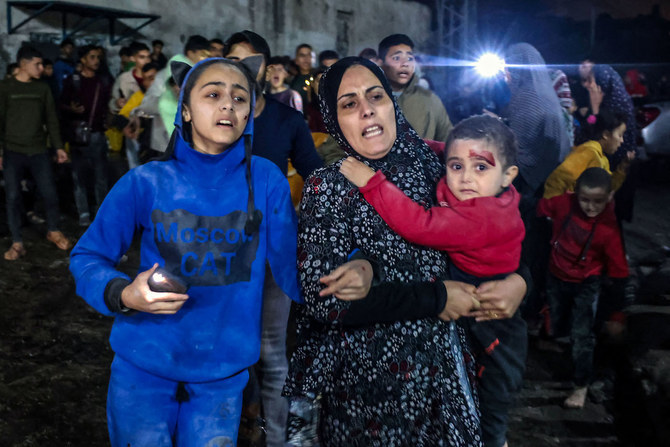
- The parliament described the move as a victory for justice and the right of the Palestinian people to establish an independent state
- Growing international recognition of a Palestinian state represented a practical response to Israel’s plans to “liquidate the Palestinian cause, which will not succeed”
CAIRO: The Arab Parliament has welcomed a decision by the governments of Spain, Norway and Ireland to recognize the state of Palestine.
The prime ministers of the three countries said on Wednesday that they would formally recognize Palestine as a state on May 28.
All three said they hoped the decision would accelerate efforts toward securing a ceasefire in Israel’s war against Hamas in Gaza, now in its eighth month.
The parliament described the move as a victory for justice and the right of the Palestinian people to establish an independent state.
It said the decision was a “new victory for the Palestinian cause and Palestinian diplomacy,” and an important step toward recognition by many countries worldwide.
The parliament said the recognition supported the legitimate rights of the Palestinian people, foremost of which is the establishment of an independent state with the city of Jerusalem as its capital.
It said that the announcements come at a time when Israel is working to destroy the Palestinian cause through “ethnic cleansing and forced displacement against civilians, including children, women, and the elderly, against whom war crimes and crimes against humanity are being committed.”
Growing international recognition of a Palestinian state represented a practical response to Israel’s plans to “liquidate the Palestinian cause, which will not succeed,” it added.
The parliament called on countries that have not yet recognized the state of Palestine to take a step toward “ending the historical injustice to which the Palestinian people have been exposed for decades of occupation and per the internationally recognized two-state solution based on international legitimacy resolutions.”
It called on the international community and all countries to stand with the Palestinian people and their just cause.
Ireland has said it will upgrade its representative office in the West Bank to a full embassy, while the Palestinian mission in Ireland will also be offered full embassy status.



